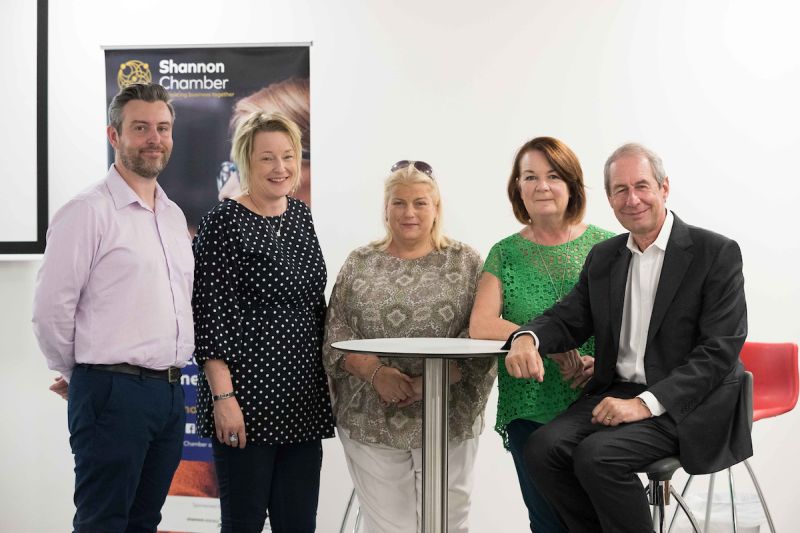
People Need to Understand the High Cost of Not Listening to their Bodies …Mental Health specialist Dr Harry Barry tells Shannon Chamber seminar
Dr Harry Barry (far right) pictured in Ei Electronics at the Mental Health and Wellbeing in the Workplace seminar with (from left): Mike O’Riordan, IT & Supply Chain director, Reagecon Diagnostics; Eilish Neville, Addiction Counsellor and Dr Deirdre Smithwick, consultant psychiatrist, Community Health team, Shannon and; Helen McQuillan, team leader, Employability Clare. Photo: Eamon Ward.
Everyone working in the business, professional or health arenas are at the risk of burnout, otherwise known as toxic stress. This was the stark warning eminent mental health specialist and author of many books on the topics of anxiety, panic, emotional resilience, and self-acceptance, Dr Harry Barry, told an audience of business executives at a recent seminar on mental health and wellbeing in the workplace, organised by Shannon Chamber in conjunction with Employability Clare.
The seminar, which was held in Ei Electronics’ Centre of Excellence in Shannon, drew a large audience who listened attentively as both Dr Barry and the director of Mental Health Services HSE for Clare, Limerick and Tipperary , Dr Deirdre Smithwick, outlined the many warning signs of stress and the supports available, through the HSE in the Mid-West, to help people of all ages through difficult periods in their lives. Mike O’Riordan, IT & Supply Chain manager with Reagecon Diagnostics also outlined the comprehensive health and wellbeing programme the company has introduced for staff.
“Toxic stress occurs when our stress systems become overwhelmed from a mixture of work and non-work-based stressors. When this happens, the body begins to pump out persistently high levels of our stress hormones adrenaline, noradrenaline and especially glucocortisol, with significant resulting consequences,” Dr Barry stated.
“Toxic stress will manifest itself in many ways such as constant fatigue, loss of interest, apathy, sleep difficulties, nightmares, teeth grinding, feeling down or flat, angered or frustrated or fighting with partners and work colleagues. It can also cause persistent headaches and body pain, poor concentration and decision making and reduction in short-term memory and, it can lead to negative behaviours such as cessation of exercise, poor diet, excessive use of alcohol or late night surfing the web,” Dr Barry stated.
Advising attendees to look out for the warning signs of stress in themselves, their work colleagues, family and friends and, accepting that there may be a problem, he suggested they explore the importance of making lifestyle changes and to seek training in emotional resilience, if warranted.
Warning against the overuse and over reliance on technology, Dr Barry stated that the most common cause of difficulty detaching from work is to fall into the habit of checking constantly, day and night, our phone for emails and social media inputs.
“We fail to understand that our brain can become addicted to such behaviour, craving positive feedback to give us a dopamine high. We can also become anxious due to the fear of missing out on some critical email or message.
“Your bedroom is not an aircraft cockpit,” he told attendees.
Advising against having devices of any kind in the bedroom, switching all technology off by 10.30pm, he warned: “Our inability to keep smartphone and other devices out of our bedroom causes the greatest damage to our health. It interferes with sleep, which has devastating consequences for our health.
“The most critical question to ask is: Is your phone in charge of you, or, are you in charge of your phone?”
Encouraging the audience to develop their resilience skills, he suggested as a first instance that they adopt a healthy life priority list which should include in ranked order: self; relationship; children; wider family; work and, lastly, interests such as hobbies, social media etc.
“The classical error of putting everyone else first, instead of self, increases our chances of developing toxic stress,” he stated.
Commenting on the value of an event of this nature for Chamber members and the wider public, Shannon Chamber CEO Helen Downes stated: “This seminar presented an amazing insight into mental health and wellbeing and how we can, individually, counteract the stressors that we allow into our lives.
“As Dr Barry stated, one of the commonest causes of stress and anxiety in the highly driven environment of today’s workplace is that we are demanding that we have absolute control of every aspect of our lives, especially at work. This leads us to demand one hundred per cent certainty in relation to both our everyday lives and at work. If we cannot achieve this demand, we rate ourselves as failures and become anxious and stressed.
“We were delighted to team up with Employability Clare and the Community Mental Health team in Shannon to bring this very important conversation to the fore. There are so many supports available to anyone feeling under pressure; all they need to do is speak up and be listened to,” Ms Downes concluded.
Further information on any of the topics discussed during this seminar are available from Employability Clare: www.employabilityclare.ie or the HSE: www.hse.ie, www.mwrdtf.ie. www.drugsie, www.askaboutalcohol.ie
